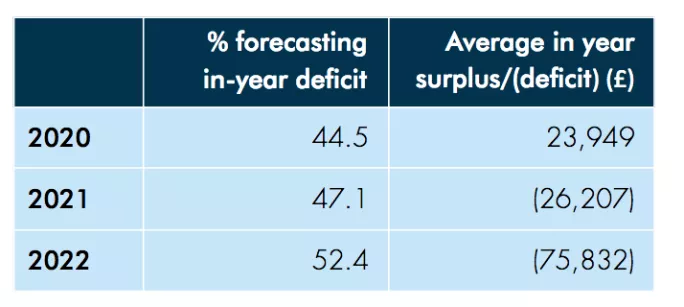More than half of academy trusts expect to be running a deficit by 2022, according to a major new study into their finances.
The annual Kreston Academies Benchmark report also reveals that nearly half of all multi-academy trusts (44 per cent) have at least one school in their group that is struggling financially.
And it warns that these “problem schools” can have a significant impact on their trusts which have on average £51,000 less left over at the end of the academic year than other trusts.
The Kreston report, which includes findings from 360 MATs and single academy trusts which run 1,500 schools, has been published today.
Top earners: Pay restraint is over for largest MATs, figures suggest
Warning: Academy trusts have run out of easy savings
Heads: Job cuts on the cards unless more funding is found
Support: Academies want extra millions to take on struggling schools
It finds that there has been an improving financial picture during 2018-19 but warns that this has been down to one-off additional funding - such as the money for “little extras” announced by former Chancellor Philip Hammond.
The report shows that over the next three years, an increasing number of trusts expect to be in deficit, with 52 per cent predicting they will be in this position by 2022.
The report says: “The financial position of the sector overall is still very volatile, while the sector overall has seen a surplus, on average in all types of trusts this should be treated with caution. The impact of one-off additional streams of revenue during the year disguises the underlying performance of the sector.”
The report shows that MATs are moving from an average £506,000 deficit in 2016-17 to a surplus of £196,00 in 2018-19.
Over the same period, primary academy finances shifted from an average per school shortfall of £159,000 in 2016-17 to a £12,000 surplus last year and secondary academies have seen results move from an average £253,000 deficit to a surplus of £13k.
The Kreston report says the announcement of the little extras was much maligned at the time but that an extra £50,000 for secondary schools and £10,000 for an average primary school has helped schools.
But it adds that as no replacement fund has been announced for 2019-20, it expects the financial performance of trusts to decline again in the current academic year.
It shows that from this year to 2022, the trusts will move from an average surplus of £23,949 to an average deficit of £75,382.
Commenting on the impact of MATs running schools with financial problems, Pam Tuckett, the chair of Kreston International’s academies group and head of education at accountants Bishop Fleming, said: “The figures show that many larger trusts could be being held back by supporting a struggling school.
“These schools often take up a significant amount of management time and can destabilise an otherwise financially sound MAT.”





